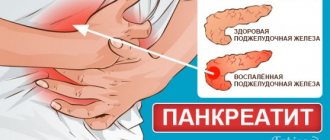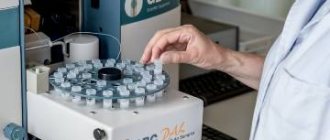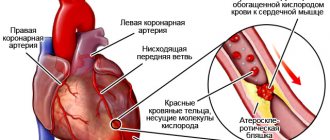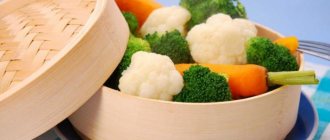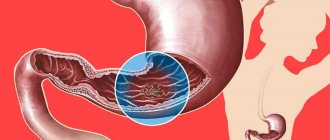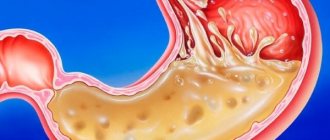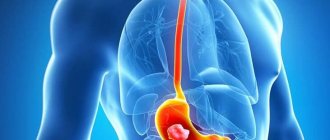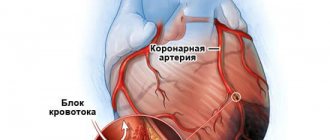Exacerbation of a stomach ulcer - how does it go?
An attack of peptic ulcer is most often caused by negative factors:
- seasonal changes in nature in spring or autumn;
- excesses in nutrition - for example, overeating during a feast;
- consumption of inappropriate products;
- drinking alcohol;
- smoking;
- heavy physical activity.
What attacks occur with an ulcer? The following symptoms come to the fore:
- muscle tension in the stomach area;
- strong pain;
- increased sweating;
- dyspeptic symptoms - heaviness in the stomach, nausea, sour vomiting that brings relief;
- problems with bowel movements.
What to do during an attack of peptic ulcer?
First aid involves the following measures.
The patient requires complete rest .
During an exacerbation, you should temporarily abstain from eating food. When the condition improves, it is important to adhere to a strict diet based on slimy soups and cereals.
You should not warm your stomach. If there is a serious suspicion of a perforated ulcer, on the contrary, it is advisable to apply a container of cold water to the abdomen. The cold will help slow the bleeding.
It is allowed to take an anesthetic (nabumetone, nimesulide, nise, etc.). Of course, it will not be able to completely “relieve the attack,” but it will help alleviate the general condition.
With increased acidity, antacids also help well - Maalox, Rennie, Gestal.
Please note, however, that choosing medications at your own risk is dangerous. It is best to consult a doctor in advance and find out exactly what is needed to stop the attacks.
If the attack is sudden and very strong, the main measure of help is to immediately call an ambulance.
You should urgently call a doctor if a person vomits “coffee grounds” and defecates tarry-colored feces, with a significant increase in body temperature, with unbearable dagger-like pain (these are characteristic signs of internal bleeding).
Completion of the acute phase
Probably, some readers will have a question: what is meant by a fading exacerbation?
The mentioned term should be understood as the persistence of endoscopic signs of intense inflammation in the absence of corresponding clinical symptoms.
To put it simply, a fading exacerbation is a period in which pronounced signs of the disease are still detected by hardware diagnostics, but are no longer felt by the patient himself.
Gradually, the ulcer scars and for the time being allows the patient to live a normal life. Don’t worry, long-term remission is quite achievable (see article Is it possible to cure an ulcer?).
Peptic ulcer is a chronic disease of the stomach or intestines. From time to time it enters an acute phase of its development. The frequency of such exacerbations depends on the lifestyle and nutrition of the patient himself. It is necessary to learn to recognize an attack of an ulcer in time so as not to provoke irreversible consequences.
Exacerbation of the disease, its dependence on external factors, gender and age
An exacerbation of a gastric ulcer is a sharp increase in the symptoms of the disease after a period of “calm” (remission). It is characterized by periodicity. Symptoms are more common in autumn and spring. Their duration ranges from 2–3 to 6–8 weeks.
In men, exacerbation occurs much more often than in women. The alternation of periods may be erased. The pain syndrome is more pronounced, and the incidence of complications is 8–15 times higher.
Stomach ulcers in women can worsen during menopause, after an abortion, or with dysmenorrhea. Pregnancy generally leads to remission.
Manifestations of exacerbation of ulcers in adolescents and young adults are erased or similar to the symptoms of duodenal ulcers. The pain is mild, heartburn is present, complications are rare. In old age, the pain is also not pronounced, it is diffuse in nature, often radiating to the back, shoulder, and collarbone.
The risk group includes people whose work is associated with constant stress, who abuse smoking and alcohol. Also, exacerbation of ulcers is more common in people who do not adhere to a diet: they eat dry food, with long breaks, and often drink carbonated drinks. Fans of spicy and fried foods are also included in this group.
What affects the frequency of attacks?
This is a number of factors that depend or do not depend on a person:
- spring/autumn. Seasonal exacerbation applies to all chronic ailments;
- alcohol;
- smoking;
- the appearance of prohibited foods in the diet;
- binge eating;
- stress and anxiety;
- frequent use of non-steroidal anti-inflammatory drugs;
- decreased immunity;
- excessive physical activity.
Doctors insist that, to a greater extent, exacerbations occur precisely after overeating and repeated consumption of foods prohibited by the diet for ulcers.
Symptoms and signs
The symptoms of a stomach ulcer attack can vary in severity depending on the individual situation. It is important not to ignore even the slightest discomfort.
- pain in or under the stomach;
- muscle tone in the abdominal area;
- sweating;
- in the stomach: heaviness, nausea, sour vomiting, after which relief comes for a short period;
- problems with bowel movements.
All these symptoms, if responded to inappropriately, threaten the development of ulcer perforation and bleeding. Therefore, it is so important to provide the patient with first aid during an exacerbation.
A person requires emergency medical care if they have tar-colored or bloody stool or vomit in the form of coffee grounds.
Complications
Perforation of a gastric ulcer if treated incorrectly or untimely can lead to the development of an abscess in the abdominal cavity. In severe cases, blood poisoning develops and the infection spreads throughout the body. This is a risk factor for death. Failure of the sutures or unskilled surgical intervention causes repeated perforation with the development of diffuse peritonitis. If the ulcer is widespread, then removal of the stomach is used, which subsequently provokes digestive problems.
First aid to a patient
The first thing the patient needs to do is to provide physical and emotional peace and lie down. Next, if the ulcer has already been diagnosed, take a painkiller prescribed by the doctor from the group of antispasmodics (Nise, Nabumetone, No-Shpa, Papaverine, Nimesulide).
Taking Aspirin, Ibuprofen, Naproxen, and other anti-inflammatory drugs is strictly contraindicated - they destroy the mucous membrane and can provoke complications of an attack.
Therefore, if someone has a painkiller at hand, and its trade name does not tell the patient anything, then you need to carefully read the composition of the drug and contraindications for taking it if the necessary drugs are not nearby. For a while, until the condition stabilizes, you need to stop eating.
If the acidity of gastric juice is increased, it will be important to take antacids: Rennie, Maalox, Gestal. Contrary to popular belief that baking soda helps reduce acidity, in the event of an attack of an ulcer, it is strictly prohibited to take it - this will only worsen the symptoms that arise.
If at this stage the person feels better, then for the next month he will need to adhere to a strict diet, excluding any irritants to the gastrointestinal mucosa.
One of the most effective folk remedies during an ulcer attack:
- fresh chicken yolk – 1 pc.;
- cocoa powder – 1 tbsp. l.;
- honey of any consistency - 1 tbsp. l.;
- butter – 1 tbsp. l.
The ingredients are mixed until smooth. The patient should take this mixture every three hours. Eating is possible only after 30 minutes. It is noteworthy that regular use of this medicine for two weeks helps to significantly delay the next exacerbation.
If the patient feels too strong, dagger-like pain in the epigastric area, then you should immediately call an ambulance and in no case, even after the situation has been stabilized by doctors, refuse hospitalization. The dynamics of exacerbation of an ulcer sometimes cannot be predicted.
If the patient is faced with an exacerbation situation for the first time, then no warm heating pads should be placed on the sore stomach. Only a doctor can confirm or refute the diagnosis of an attack, and in some cases with similar symptoms, heat can lead to irreversible consequences in the body.
If the symptoms described above appear, it will be useful to drink 100 ml of fresh potato juice, or a little warm milk, or flax decoction. Such a drink will help soothe the walls of the mucous membrane in the future, at the end of the acute phase.
Diet selection
The first thing to do when an ulcer worsens is to follow a diet. Nutrition has a great influence on the human body, so if you choose the right diet, you can speed up the wound healing process and prevent the progression of unpleasant symptoms.
The following products should appear on the daily menu:
- Dietary soups and chicken broths.
- Meat with minimal fat content.
- Liquid porridge.
- Omelettes and egg products.
- Skim cheese.
- Bee Honey.
A strict diet prohibits the consumption of the following:
- Alcohol.
- Butter and flour products.
- Smoked dishes.
- Drinks with caffeine.
- Hot sauces, marinades and pickles.
The key requirement for the form of nutrition is balance and adherence to a schedule. The patient should follow the doctor's advice and point out any deviations from the normal state.
Diet principles
When choosing food for your diet, you need to exclude those foods that will increase acidity in the stomach, as this will only aggravate the problem. It is forbidden to starve or endure discomfort.
It is also necessary to adhere to the following principles:
- The food is exclusively dietary and does not irritate the mucous membranes.
- Products should be easily absorbed by the body, so it is better to consume them in liquid or crushed form.
- Hot and cold dishes are contraindicated, because... they stop the process of enzyme formation and prevent the restoration of mucous membranes. The optimal temperature varies between +26…+33ºС.
- You need to eat food in small portions and not take breaks for more than 3 hours. The interval between doses depends on the patient's condition.
- The optimal drinking regime is 1.5-2 liters of clean drinking water per day.
The first diet, which allows you to speed up the healing of ulcers and reduce discomfort in the stomach, was developed by nutritionist Mikhail Pevzner.
Treatment
After scientists established a common cause for the development of peptic ulcers of the gastrointestinal tract - the bacterium Helicobacter pylori, treatment became more effective.
The first thing therapy begins with is antibiotics. They are prescribed together with other drugs that provide mucosal protection. The full course ensures the absence of attacks of ulcers for many years, and with proper and disciplined compliance with all doctor’s instructions – for life.
The most important condition for the absence of exacerbations is adherence to the diet. In order for the patient not to feel discomfort in the abdomen, it is necessary to avoid starvation, but you should not overeat.
- marinades, pickles;
- sour vegetables, fruits, dairy products;
- tomatoes, cucumbers - especially during an exacerbation;
- fresh garlic, onions, hot spices;
- smoked meat;
- fried foods;
- fresh baked goods, baked goods;
- coffee, strong black tea;
- dumplings, canned food and other store-bought semi-finished products.
This list will expand significantly if the patient’s individual intolerance to certain products is identified. For example, when you have an ulcer, it is often recommended to drink a little warm milk. Indeed, it has a good effect on the walls of the gastric mucosa, but after 20 years the amount of the enzyme that processes it decreases. Therefore, flatulence, bloating, and diarrhea occur.
Of course, treating an ulcer will be a wasted effort if the patient cannot give up smoking and drinking alcoholic beverages. It has been proven that after a week of quitting smoking, patients stop having stomach pains that have been bothering them for a long period.
Allowed for use:
- liquid-like pureed soups. However, since they are high in carbohydrates, their consumption should be moderate;
- porridge of viscous consistency. Oatmeal, rice, buckwheat are suitable for this;
- mashed potatoes - it coats well the mucous membrane of the stomach and intestines, thus also performing a protective function;
- boiled or steamed vegetables;
- weak herbal teas.
A more extensive menu will be suggested by the attending physician, taking into account the individual characteristics of the course of the disease and the level of acidity of gastric juice.
Preventive measures
In order to prevent the development of peptic ulcer disease, and not to suffer from exacerbations from time to time, you need to adhere to simple rules of prevention:
- eat regularly and well. It is nutrition that ensures the normal functioning of the gastrointestinal tract;
- try to drink alcohol in minimal quantities;
- keep your psycho-emotional state under control. Frequent stress, or too acute a negative reaction to certain ongoing events, brings a person closer to a state close to an ulcer;
- avoid frequent overeating;
- Do not self-medicate with medications. We are talking about non-steroidal anti-inflammatory drugs. It is they, and a number of other drugs, that, if used incorrectly, have a detrimental effect on the mucous membrane of the stomach and intestines.
Consequently, an attack of peptic ulcer disease occurs as a result of a person’s deviation from the rules of lifestyle and nutrition during this disease.
In most cases, the patient can independently take measures to eliminate painful symptoms, while some of them serve as a reason to seek emergency medical help.
Peptic ulcer is a chronic disease of the stomach or intestines. From time to time it enters an acute phase of its development. The frequency of such exacerbations depends on the lifestyle and nutrition of the patient himself. It is necessary to learn to recognize an attack of an ulcer in time so as not to provoke irreversible consequences.
Causes of stomach ulcers
The mucous membrane is both an assistant to our stomach and its protector. It prevents damage to the organ by actively produced hydrochloric acid, protects it from the effects of rough food and microorganisms.
There may be a lack of mucus, then the aggressive environment penetrates the protective layer and directly attacks the walls of the digestive organ. An ulcer forms. Why does the mucous membrane suddenly become thinner?
- Infection. The pest bacteria Helicobacter pylori enters the body through kissing with a sick person (through saliva), through failure to comply with sanitary and hygienic standards (dishes not washed with insufficient care or lack of proper sterile treatment of medical instruments), through consumption of contaminated food or water, from mother to baby , forming in her womb. It has been scientifically established that more than half of all cases of peptic ulcer disease are associated precisely with the activity of Helicobacter pylori microbes, which eat our mucous membranes, causing a chemical burn!
- Taking medications. Beware of self-medication and taking medications without a doctor’s prescription! The use of antibacterial drugs (aspirin, ibuprofen, diclofenac), glucocorticoid hormones (prednisolone), and antihypertensive drugs (reserpine) has a particularly negative effect on the condition of the stomach.
- Acute diseases and pathological conditions. Injuries to internal organs, burns or frostbite, blood poisoning (sepsis), shock.
- Exacerbation of chronic diseases. If you are diabetic or suffer from hepatitis, tuberculosis or syphilis, lung cancer or cirrhosis of the liver, your risk of developing the disease increases.
- Stress. Nervous stress weakens the entire body and its individual systems. Negative emotions and depression, lack of rest, lack of sleep directly affect the well-being or ill-being of our gastrointestinal tract.
- Bad habits and departure from a healthy lifestyle. Alcohol, tobacco, coffee in large quantities, coarse, too hot or cold food, spicy, salty, sweet and fried - we can exclude from the diet, which will greatly delight our internal organs.
- Naturally, genetic predisposition. In case of unfavorable heredity, you especially strictly need to observe the rules of personal hygiene and carefully monitor your diet.
There are many reasons for the development of stomach ulcers, and it’s not just quick meals or dry snacks. The disease may have much deeper roots.
What affects the frequency of attacks?
This is a number of factors that depend or do not depend on a person:
- spring/autumn. Seasonal exacerbation applies to all chronic ailments;
- alcohol;
- smoking;
- the appearance of prohibited foods in the diet;
- binge eating;
- stress and anxiety;
- frequent use of non-steroidal anti-inflammatory drugs;
- decreased immunity;
- excessive physical activity.
Doctors insist that, to a greater extent, exacerbations occur precisely after overeating and repeated consumption of foods prohibited by the diet for ulcers.
Symptoms and signs
The symptoms of a stomach ulcer attack can vary in severity depending on the individual situation. It is important not to ignore even the slightest discomfort.
- pain in or under the stomach;
- muscle tone in the abdominal area;
- sweating;
- in the stomach: heaviness, nausea, sour vomiting, after which relief comes for a short period;
- problems with bowel movements.
All these symptoms, if responded to inappropriately, threaten the development of ulcer perforation and bleeding. Therefore, it is so important to provide the patient with first aid during an exacerbation.
A person requires emergency medical care if they have tar-colored or bloody stool or vomit in the form of coffee grounds.
Classification
There are several classifications of perforated ulcers, the treatment of which is based on certain distinctive features. If we consider the forms of the disease relative to their origin, we distinguish:
• perforation of a chronic form of peptic ulcer;
• perforation of an acute ulcer (symptomatic, hormonal or stress forms are distinguished);
• the appearance of a hole may occur as a result of a violation of the integrity of the tumor wall;
• parasitic type perforation;
• the cause of perforation may be a state of thrombosis caused by an advanced form of atherosclerosis.
There is a classification of this disease regarding location. Gastric ulcers are distinguished: relative to the curvature (large or small), relative to the sections of the stomach, the anterior wall or the posterior one. The second type is ulcerative diseases of the duodenum: there are bulbar forms and a postbulbar variety.
There is a classification according to the clinical manifestations of the pathological condition:
- Effusion of stomach secretions directly into the abdominal cavity. It is divided into typical and covered forms.
- Atypical distribution of acidic juice; into the intercompartmental cavity (an area limited from other organs), into the omental bursa, into the greater or lesser omentum.
- The flow of juice accompanied by bleeding: can occur in any part of the gastrointestinal tract, directly in the abdominal region.
The classification by stages of development is given in the symptoms section.
First aid to a patient
The first thing the patient needs to do is to provide physical and emotional peace and lie down. Next, if the ulcer has already been diagnosed, take a painkiller prescribed by the doctor from the group of antispasmodics (Nise, Nabumetone, No-Shpa, Papaverine, Nimesulide).
Therefore, if someone has a painkiller at hand, and its trade name does not tell the patient anything, then you need to carefully read the composition of the drug and contraindications for taking it if the necessary drugs are not nearby. For a while, until the condition stabilizes, you need to stop eating.
If the acidity of gastric juice is increased, it will be important to take antacids: Rennie, Maalox, Gestal. Contrary to popular belief that baking soda helps reduce acidity, in the event of an attack of an ulcer, it is strictly prohibited to take it - this will only worsen the symptoms that arise.
If at this stage the person feels better, then for the next month he will need to adhere to a strict diet, excluding any irritants to the gastrointestinal mucosa.
One of the most effective folk remedies during an ulcer attack:
- fresh chicken yolk – 1 pc.;
- cocoa powder – 1 tbsp. l.;
- honey of any consistency - 1 tbsp. l.;
- butter – 1 tbsp. l.
The ingredients are mixed until smooth. The patient should take this mixture every three hours. Eating is possible only after 30 minutes. It is noteworthy that regular use of this medicine for two weeks helps to significantly delay the next exacerbation.
If the patient is faced with an exacerbation situation for the first time, then no warm heating pads should be placed on the sore stomach. Only a doctor can confirm or refute the diagnosis of an attack, and in some cases with similar symptoms, heat can lead to irreversible consequences in the body.
Treatment
After scientists established a common cause for the development of peptic ulcers of the gastrointestinal tract - the bacterium Helicobacter pylori, treatment became more effective.
The first thing therapy begins with is antibiotics. They are prescribed together with other drugs that provide mucosal protection. The full course ensures the absence of attacks of ulcers for many years, and with proper and disciplined compliance with all doctor’s instructions – for life.
- marinades, pickles;
- sour vegetables, fruits, dairy products;
- tomatoes, cucumbers - especially during an exacerbation;
- fresh garlic, onions, hot spices;
- smoked meat;
- fried foods;
- fresh baked goods, baked goods;
- coffee, strong black tea;
- dumplings, canned food and other store-bought semi-finished products.
This list will expand significantly if the patient’s individual intolerance to certain products is identified. For example, when you have an ulcer, it is often recommended to drink a little warm milk. Indeed, it has a good effect on the walls of the gastric mucosa, but after 20 years the amount of the enzyme that processes it decreases. Therefore, flatulence, bloating, and diarrhea occur.
Of course, treating an ulcer will be a wasted effort if the patient cannot give up smoking and drinking alcoholic beverages. It has been proven that after a week of quitting smoking, patients stop having stomach pains that have been bothering them for a long period.
Allowed for use:
- liquid-like pureed soups. However, since they are high in carbohydrates, their consumption should be moderate;
- porridge of viscous consistency. Oatmeal, rice, buckwheat are suitable for this;
- mashed potatoes - it coats well the mucous membrane of the stomach and intestines, thus also performing a protective function;
- boiled or steamed vegetables;
- weak herbal teas.
A more extensive menu will be suggested by the attending physician, taking into account the individual characteristics of the course of the disease and the level of acidity of gastric juice.
Why does it worsen?
Periodic recurrence of gastric ulcers is caused by a violation of protective mechanisms. The most aggressive factor affecting the walls of the stomach is hydrochloric acid. An increase in the production of the substance during exacerbation of a gastric ulcer by parietal cells leads to irritation of the walls, the development of inflammation and the formation of new ulcerative surfaces. Deterioration of the condition can be caused by the backflow of bile into the stomach cavity from the duodenum.
When eating excess amounts of spicy, fatty and salty foods, prolonged stressful situations, and overwork, the protective properties of gastric mucus are reduced. Taking certain medications may aggravate the condition. The main cause of the development of the ulcerative process is the microorganism Helicobacter pylori.
Helicobacter pylori bacterium
Preventive measures
In order to prevent the development of peptic ulcer disease, and not to suffer from exacerbations from time to time, you need to adhere to simple rules of prevention:
- eat regularly and well. It is nutrition that ensures the normal functioning of the gastrointestinal tract;
- try to drink alcohol in minimal quantities;
- keep your psycho-emotional state under control. Frequent stress, or too acute a negative reaction to certain ongoing events, brings a person closer to a state close to an ulcer;
- avoid frequent overeating;
- Do not self-medicate with medications. We are talking about non-steroidal anti-inflammatory drugs. It is they, and a number of other drugs, that, if used incorrectly, have a detrimental effect on the mucous membrane of the stomach and intestines.
Consequently, an attack of peptic ulcer disease occurs as a result of a person’s deviation from the rules of lifestyle and nutrition during this disease.
In most cases, the patient can independently take measures to eliminate painful symptoms, while some of them serve as a reason to seek emergency medical help.
Nutrition is an important component of health
There are different approaches to diets for stomach ulcers. Some scientists believe that giving up certain foods is not worth it, because it leads a person to depression. Others strictly exclude certain foods. Russian nutritional scientists suggest that patients with ulcers should forget about such foods as:
- canned food;
- strong coffee, tea, carbonated drinks;
- rich meat broths;
- sweet, spicy and fatty.
You should give preference to such dishes as:
- cutlets, omelettes, cottage cheese soufflés, steamed chicken soufflés;
- milk porridges, milk soups;
- soft-boiled eggs, steamed lean fish;
- bread in the form of white bread croutons;
- cookies, cheese; apples, berry soufflé;
- milk, rose hip decoction, jelly.
The main condition is not to overeat, eat in small portions, and protect the stomach as much as possible from mechanical and chemical irritation. You need to eat varied, tasty, always eat fresh food.
Stomach ulcer is the scourge of our time. According to statistics, about 14% of the entire world population suffers from this disease. Students and pensioners, young mothers and mature people are looking for answers to questions about what is the cause of peptic ulcer disease, what symptoms can be used to identify it, how to cure it and whether it is possible to avoid its reoccurrence.
An attack of a stomach ulcer - what to do to relieve it?
Published: June 18 at 12:55
Are you still suffering from GASTRITIS? It is not the effect that needs to be treated, but the cause,” says Olga Kirovtseva.
Dull or aching pain in the stomach is periodically replaced by pronounced cutting sensations that characterize an acute attack of an ulcer. This condition can be caused by seasonal weather changes, heavy physical activity, drinking alcohol, fatty or spicy foods in large quantities. That is why gastroenterologists always warn their patients about possible exacerbations, recommending that they lead a measured lifestyle, adhere to a diet, and completely give up alcohol and cigarettes. But not all people follow these recommendations, which is why attacks of stomach ulcers occur with some regularity.
How to relieve an ulcer attack on your own?
Naturally, when an attack of peptic ulcer occurs, it is best to immediately call a doctor. But sometimes this is not possible, for example, when a person is outside the city. In this case, you have to eliminate the unpleasant symptoms with the help of available medications or improvised means.
No more bloating, diarrhea, heartburn, heaviness and other symptoms of GASTRITIS! Our readers are already using this method to treat gastritis.
First of all, it is necessary to provide the patient with complete rest. You should also temporarily, at least until examined by a doctor, refuse to eat any food. For medications, you can take a couple of tablets of No-Shpa or Papaverine. The fact is that the symptoms of an attack of a stomach ulcer are based on antispasmodic pain caused by contraction of the walls of the muscle sac, and No-Shpa and Papaverine are antispasmodics. At the same time, they should be taken very carefully by people suffering from hypotension, as a decrease in blood pressure is possible.
If there are no medications, regular baking soda will do. which quickly reduces acidity levels and relieves pain. But it is not recommended to abuse sodium bicarbonate, since with constant use it provokes an even greater release of hydrochloric acid. Soda is only allowed to relieve acute symptoms of the disease when there are no medications available. After this, you should immediately go to the doctor.
A good remedy for an acute attack of ulcers is the mashed yolk of a fresh chicken egg, mixed with cocoa powder, honey and butter, taken in approximately the same volume. A homogeneous mass is taken every 3 hours, 1 tbsp. spoon. You can eat food after taking the medicine no earlier than half an hour later.
A mixture prepared according to this recipe very quickly relieves the symptoms of the first attack of peptic ulcer. To exclude relapses, it is recommended to continue taking it for two weeks.
By secret
- Are you tired of stomach pain, nausea and vomiting...
- And this constant heartburn...
- Not to mention bowel disorders, alternating with constipation...
- It’s sickening to remember the good mood from all this...
Therefore, we recommend that you read the story of Olga Kirovtseva about her recovery from GASTRITIS. »
How to recognize the symptoms?
After eating, a burning sensation occurs in the esophagus.
The acute period is difficult to miss, since it is accompanied by pronounced symptoms. During the acute period, the patient is concerned about the following signs of exacerbation of the ulcer:
- Pain syndrome. It appears when the mucous membrane is irritated, and can have a sharp, aching, sharp, pulling character. Often the pain spreads to the left side, hypochondrium and back. A painful attack in an acute ulcer is divided into several types: early, occurring immediately, 30-60 minutes after eating;
- late, disturbing 2 hours or more after a meal;
- hungry, passing after eating food.
To avoid complications, it is recommended to visit a gastroenterologist in the spring and autumn, especially if you are prone to latent exacerbations.
What to do if symptoms of a gastritis attack appear?
When the functioning of certain organs is disrupted, painful symptoms of varying intensity occur. An attack of gastritis makes itself felt by pain in the epigastric region. There are certain clinical symptoms of gastritis, with which you can establish the correct diagnosis and prescribe effective treatment.
Classification of gastritis
- acute gastritis, in which pain occurs as a result of severe inflammation of the gastric mucosa. Acute gastritis occurs, as a rule, due to the ingestion of pathogenic microorganisms, as well as aggressive liquids such as alcoholic beverages, coffee;
- relapse of chronic gastritis. In this case, the symptoms of gastritis will depend on the stage of damage to the gastric mucosa, as well as on the prevalence of the pathological process.
How does an acute attack manifest?
An attack of acute gastritis is always caused by some reasons that contributed to the pathological condition. The patient experiences symptoms such as vomiting and increased body temperature. Painful symptoms usually occur in the epigastric region. Usually these are sharp, severe pains. After vomiting, the patient experiences relief for some time. The stool may appear as diarrhea or remain unchanged. These symptoms are a signal of an urgent visit to the doctor. The healthcare professional will rinse your stomach and tell you what to do next. Sometimes patients with attacks of gastritis are sent to an infectious diseases hospital.
Clinical picture of exacerbation of chronic gastritis
During attacks of chronic gastritis, an increase in body temperature is usually not observed. As a rule, this phenomenon is typical for the autumn and spring seasons; it occurs with excessive consumption of junk food, as well as exposure to nervous disorders.
Painful symptoms of gastritis appear several hours after eating. If the gastric mucosa is severely damaged, pain may appear 30 minutes after eating food. With simultaneous damage to the stomach and duodenum, pain occurs in the absence of food and decreases after eating it.
When an attack of gastritis occurs, clinical symptoms such as nausea accompanied by vomiting occur, after which relief of the condition is observed. During palpation of the abdomen, the patient feels pain, which increases when tapping the anterior surface of the peritoneum with fingers.
Help when an attack occurs
If you are aware of what to do when a gastritis attack occurs, you can achieve improvement in your condition and prevent further serious consequences of a gastritis attack. Erosive gastritis causes bleeding in the gastrointestinal area, and a stomach ulcer may also appear, which in turn can lead to cancer.
When you have an acute attack, drink plenty of warm water, induce vomiting and cleanse your stomach. For two days after an attack of gastritis occurs, it is better not to eat anything at all. Take a horizontal position on your side, pull your legs towards your stomach. This position provides excellent muscle relaxation during an attack of gastritis. You need to lie like this for 30 minutes. A bottle of cold water can help relieve pain. To get rid of nausea, take a slice of lemon and put it in your mouth. After 12 hours, if you manage to stop vomiting, drink sweet tea.
- during an attack of gastritis, you need to eat mucous soups and cereals, drink medicinal mineral water;
- Antispasmodics, antacids, and proton pump inhibitors help relieve pain during an attack;
- It is recommended to prepare a decoction of herbs: mint, St. John's wort, chamomile, anise, calendula;
- After completing the above steps, be sure to visit a doctor to undergo a medical examination and prescribe an effective treatment for gastritis.
The diet should be followed for a week after an attack of gastritis occurs. You should not use non-steroidal anti-inflammatory drugs. These medications irritate the mucous part of the stomach and lead to hemorrhages in the gastrointestinal tract. It should also be remembered that treatment of attacks of gastritis will not be effective unless the patient refuses junk food: fatty, fried, spicy. It is necessary to completely eliminate alcohol and smoking from the diet. Due to the fact that the state of the nervous system has a direct effect on an attack of gastritis, you can take valerian or motherwort.
Clinical manifestations
Peptic ulcer disease is characterized by epigastric pain that occurs on an empty stomach, 2 hours after eating, and also at night. Eating food for a short period of time reduces the intensity of pain. The pain syndrome is complemented by vomiting, heartburn, and sour belching.
Patients with ulcers are characterized by weight loss, a coated tongue, and pain on palpation in the area of the duodenal bulb and in the epigastric region.
PUD is characterized by a chronic course (alternating remissions and exacerbations). Exacerbations occur in the spring-autumn period and last on average about 1-2 months and manifest themselves by the presence of the complaints described above, and in some cases lead to the development of complications that require urgent medical intervention .
